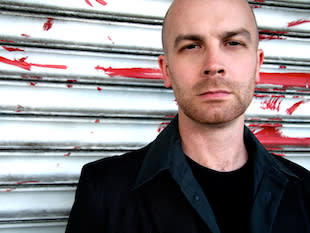 The Sideshow
The SideshowHow Scott Sigler used free media to become a best-selling author

"I'm writing to give people incredible value for their dollar, not win awards."
San Francisco-based writer Scott Sigler is a New York Times best-selling novelist. The science fiction and horror writer has a growing fan base, and when he tours the country to promote a book, as he recently did for his new novel "Nocturnal," those same fans show up.
But it wasn't always like this. Scott Sigler used to give away all of his writing for free and says it was the best career move he ever made.
"Meeting the fans is fantastic. But it's the people who already like you [who show up to book readings]," Sigler said in an interview with Yahoo News.
So rewind the clock several years before Sigler had four popular novels released under the Crown Publishing label. He was still a writer but one without a dedicated audience. That's when Sigler began taking an unconventional route toward building his readership: He started giving away his writing for free.
"If they try you out for free, they become lifelong customers. There are so many affordable ways to go find people. For readers, they are respected as intelligent consumers," Sigler said.
Sigler began this process when he started offering readers free access to the book "Earthcore," which he says was the world's first podcast-only novel, released in 20 weekly episodes.
Over the years, Sigler's self-described "junkie" fans have downloaded more than 15 million individual episodes of his stories in this format.
That led to his publishing deal with Crown. But in some ways, it was only the beginning of Sigler's continued use of free media to introduce new readers to his content.
With his publisher's blessing, Sigler began producing video trailers for his novels. Here's the trailer for "Nocturnal":
"The greatest advantage of a trailer is the people who stumble upon it. Getting people who would otherwise never hear of you," he said.
He wasn't the first author to have a trailer made for his book. Other famous book trailers like the one for "Abraham Lincoln: Vampire Hunter" racked up millions of page views. Even cerebral author Thomas Pynchon has a book trailer for his 2009 novel "Inherent Vice." And authors like Cory Doctorow have given away versions of their books for years.
The difference has been in Sigler's do-it-yourself approach. When he produced his first book trailer, Sigler enlisted the help of his fans and film students. Sigler used his own money to fund the projects, even buying food for the artists who helped create his first book trailer.
For "Nocturnal," he worked with artist John Dunivant and animator Kevin Capizzi, and enlisted acclaimed YouTube voice artist Toby Turner to provide the trailer's voice over.
"I wanted a trailer that was in the style of an enhanced comic to reflect the over-the-top content of the story," Sigler said. "I'm thrilled with the trailer. We've gotten better as we go. It's been enormously helpful in selling books."
The idea of giving away content for free is anathema to most authors. Twelve years ago when I was working for a college radio station in Eugene, Oregon, I thought it would be a fun idea to broadcast an audio recording of my favorite author, Harlan Ellison, reading a version of his story, "Paladin of the Lost Hour." I cheerily sent a letter to the famously contentious writer's Kilimanjaro Corporation, informing them of my intentions.
The day the letter arrived at Ellison's offices, I almost immediately found a response note pinned to my mailbox from our station's manager, which read, "Some guy named Harlan Ellison called." The letter then proceeded to describe Ellison's demeanor in a series of colorful expletives.
Naturally, I was terrified. But when I called Ellison back, he couldn't have been more of a gentleman. He simply asked that I mail him a check for any denomination, even one penny. It was the principle. He is a professional writer and was going to be paid for any use of his material.
"The 'Old Guard' of really established guys don't need to do it," Sigler said of his literary predecessors. "They have such a huge audience already. Newer authors and beginning authors have to start thinking about using the Internet to get an audience."
And while Sigler's approach is cutting edge, it is simultaneously a back-to-basics approach to the craft. One of the earliest lessons writers might learn is to read their own material aloud,to check for mistakes and to gauge the general flow of their content. Sigler says recording podcasts of his work has greatly enhanced his own writing.
"It completely changed my style of writing," he said. "When you're reading it out loud, you can kind of hear your pretentiousness. You're not getting any story information; you're just kind of showing off as a writer."
Another benefit Sigler says he gets from sharing his material with fans is an abundance of constructive reader feedback. Along with giving away podcasts of his writing, he interacts with his fans daily through his personal website and other social media outlets like his Twitter account.
The notion of using alternative mediums to promote a writer's work is nothing new. The only real difference between Sigler's approach and the infamous "War of the Worlds" radio program hosted by Orson Welles is that Sigler's listeners know what they're signing up for.
"Aside from books, most of my influences are movies," Sigler said. "I'm a big fan of commercials, the art form of commercials. Sixty seconds that makes people want to go see something."
Watch a behind-the-scenes video of the making of the "Nocturnal" trailer:
More popular Yahoo! News stories
• 6-year-old girl handcuffed by police over 'tantrum'
• Space shuttle Discovery reaches final destination in Washington, DC
• 83-year-old model Daphne Selfe says she's never had cosmetic surgery

